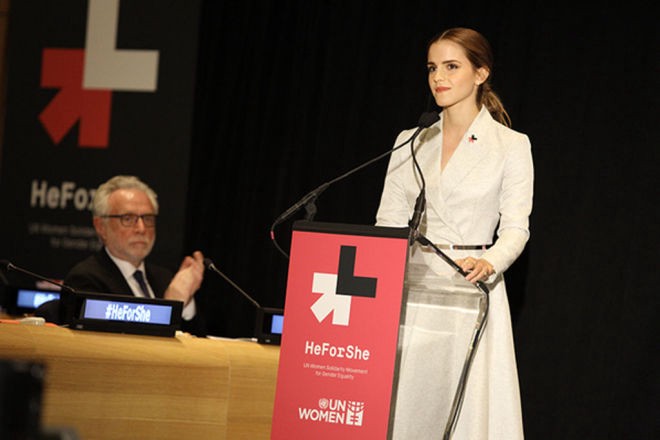It’s no secret that the word “feminism” has a PR problem. Just this spring, Shailene Woodley echoed the (misinformed) sentiments of a lot of girls and women when she declared that she wasn’t a feminist because, as she explained, “I love men.”
We’re not interested in pitting Woodley against her peers, but it’s worth noting that the Divergent actress might have been whom Emma Watson had in mind when the latter gave a speech two days ago at the United Nations in her capacity as a UN Goodwill Ambassador, explaining why feminism is the opposite of man-hating.
At the podium, Watson first shared the origins of her own feminism:
I started questioning gender-based assumptions when at eight I was confused at being called “bossy,” because I wanted to direct the plays we would put on for our parents — but the boys were not.
When at 14 I started being sexualized by certain elements of the press.
When at 15 my girlfriends started dropping out of their sports teams because they didn’t want to appear “muscly.”
When at 18 my male friends were unable to express their feelings.
Then she gave us her (noncontroversial) definition of feminism:
Apparently I am among the ranks of women whose expressions are seen as too strong, too aggressive, isolating, anti-men and, unattractive.
Why is the word [feminist] such an uncomfortable one?
I am from Britain and think it is right that as a woman I am paid the same as my male counterparts. I think it is right that I should be able to make decisions about my own body. I think it is right that women be involved on my behalf in the policies and decision-making of my country. I think it is right that socially I am afforded the same respect as men.
But sadly I can say that there is no one country in the world where all women can expect to receive these rights.
And finally she explained why gender inequality and stereotyping hurts men too — and how feminism can help men to be seen as full human beings, rather than just a cardboard cutout of macho stoicism, too:
Men — I would like to take this opportunity to extend your formal invitation. Gender equality is your issue too.
Because to date, I’ve seen my father’s role as a parent being valued less by society despite my needing his presence as a child as much as my mother’s.
I’ve seen young men suffering from mental illness unable to ask for help for fear it would make them look less “macho” — in fact in the UK suicide is the biggest killer of men between 20–49; eclipsing road accidents, cancer and coronary heart disease. I’ve seen men made fragile and insecure by a distorted sense of what constitutes male success. Men don’t have the benefits of equality either. … We don’t often talk about men being imprisoned by gender stereotypes but I can see that that they are and that when they are free, things will change for women as a natural consequence.
Watch Watson’s entire speech below.
[via UN Women]






